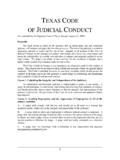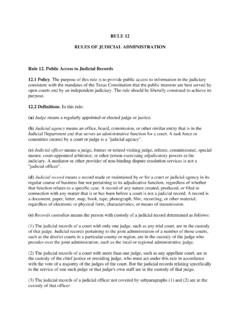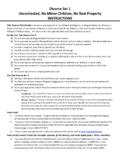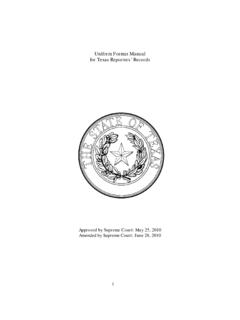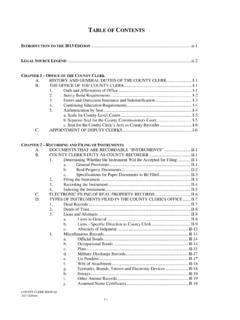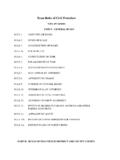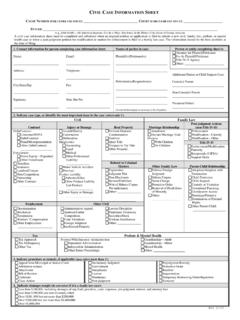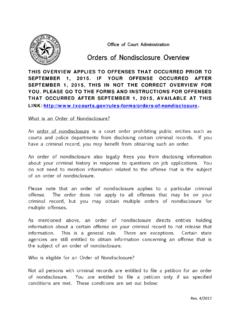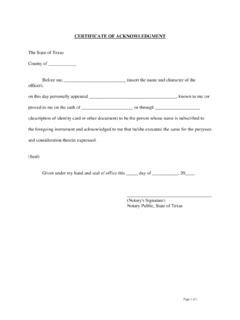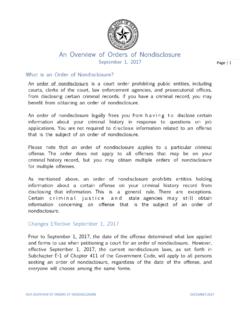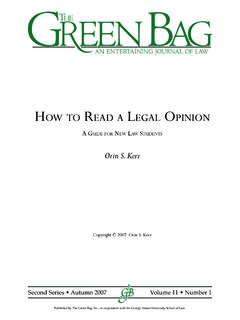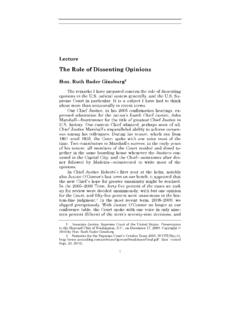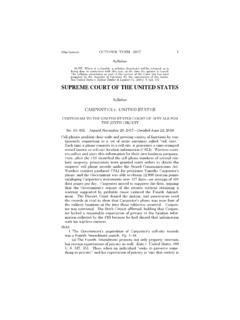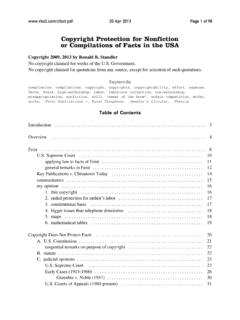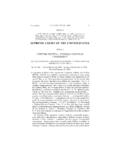Transcription of Regional Rules of Administration - txcourts.gov
1 Regional Rules OF Administration NINTH ADMINISTRATIVE judicial REGION RULE 1: TIME STANDARDS FOR THE DISPOSITION OF CASES District and statutory county court judges of the county in which cases are filed should, so far as reasonably possible, ensure that all cases be brought to trial or final disposition in conformity with the following time standards: a. CRIMINAL CASES Set for trial within 180 days from date of indictment or information except for good cause shown. b. CIVIL CASES OTHER THAN FAMILY LAW (1) (2) Civil Jury Cases Within 18 months from appearance date. Civil Non-jury Cases Within 12 months from appearance date. c. FAMILY LAW CASES (1) Contested Family Law Cases Within 6 months from appearance date or within 6 months from the expiration of the waiting period provided by the Family Code where such is required, whichever is later.
2 This provision shall not apply to cases arising under Chapter 262, Texas Family Code. (2) Uncontested Family Law Cases Within 3 months from appearance date or within 3 months from the expiration of the waiting period provided by the Family Code where such is required, whichever is later. This provision shall not apply to cases arising under Chapter 262, Texas Family Code. d. JUVENILE CASES In addition to the requirements of Title 3, Texas Family Code: (1) Detention Hearings Shall be held promptly, but not later than the second working day after a juvenile is taken into custody; provided, however, that when a juvenile is detained on a Friday or Saturday, then such detention hearing shall be held on the first working day after the juvenile is taken into custody.
3 (2) Adjudicatory or Transfer (Waiver) Hearings (a) Concerning a juvenile in a detention facility: Not later than 10 days following the filing of the petition, except for good cause shown of record. (b) Concerning a juvenile not in a detention facility: Not later than 30 days following the filing of the petition, except for good cause shown of record. (3) Disposition Hearings Not later than 15 days following the adjudicatory hearing. The court may grant additional time in exceptional cases that require more complex evaluation. (4) Nothing herein shall prevent a judge from recessing a juvenile hearing at any state of the proceeding where the parties are agreeable or, when in the opinion of the judge presiding in the case, the best interests of the child and of society shall be served.
4 E. COMPLEX CASES It is recognized that in especially complex cases or special circumstances it may not be possible to adhere to these standards. RULE 2: The local administrative judge or judges of each county shall, upon request by the presiding judge, cause to be sent to the presiding judge such information regarding docket management systems of the county as may be requested by the presiding judge. RULE 3: The boards of judges, or judges giving preference to civil cases in each county, must adopt and uniformly follow local Rules governing the filing, docketing and assignment of civil cases to achieve the time standards of Rule 6 of the Rules of judicial Administration and meet the requirements of Rules 7, 9 and 10 of the Rules of judicial Administration .
5 "Board of Judges," as used in these Rules , means the judges of the district courts and statutory county courts of a county. RULE 4: The board of judges, or judges giving preference to family law and juvenile cases in each county, must adopt and uniformly follow local Rules governing the filing, docketing and assignment of family law and juvenile cases to achieve the time standards of Rule 6 of the Rules of judicial Administration and meet the requirements of Rules 7, 9 and 10 of the Rules of judicial Administration . RULE 5: The board of judges, or judges giving preference to criminal cases in each county, should adopt and uniformly follow local Rules conforming with Rule 1 for the processing of criminal cases.
6 RULE 6: The district judge or judges of each county must, if required by law, adopt a jury plan governing the selection, management, assignment and time of jury service, and file the same with the district clerk, and, when required, secure the approval of the commissioners court. RULE 7: The board of judges of each county may adopt a plan for judicial absences for vacation, educational events, and a method of notifying the Regional presiding judge of the need for visiting judges. RULE 8: (a) The Rules adopted by a board of judges within this administrative region must conform to the requirements of these Rules . (b) Local Rules shall not be effective until approved by the presiding judge of the administrative region and by the Supreme Court of Texas.
7 RULE 9: The board of judges of each county may adopt as a part of the local Rules a rule providing for regular meetings of the judges, committee assignments and other designations of duties necessary to the work of the courts of the county as required by Chapter 74, Government Code. RULE 10: CONFLICTING ENGAGEMENTS: (a) Attorney already in trial in another court: (1) When informed that an attorney is presently in trial, the court will determine where and when assigned. This information will be verified upon request of opposing counsel. The case will be placed on "hold" or reset, depending on when the attorney will be released. (2) If the attorney is not actually in trial as represented by the attorney or the attorney's agent, the case will be tried without further notice.
8 (b) Attorney assigned to two courts for the same date: (1) It is the duty of an attorney to call the affected judges' attention to all dual settings as soon as they are known. Any motion for continuance on the ground that an attorney is set for trial or other hearing in two or more courts on the same date shall be filed in all affected courts and shall contain case identifying information as to all conflicting settings. (2) Insofar as practicable, judges should attempt to agree on which case has priority; otherwise, the following priorities shall be observed by the judges of the respective courts: (I) Criminal cases. (II) Cases given preference by statute. (III) Preferentially set cases.
9 (IV) Case set at earliest date. (V) Case with earliest filing date. (VI) Courts in multi-judge counties should yield to courts in rural counties in all other instances of conflicting settings. (3) In the event the affected judges cannot agree on which case has priority under this rule, the priority shall be decided by the Local Administrative Judge if the cases are pending in the same county, or the Presiding Judge of the Ninth Administrative judicial Region in all other cases. _____ _____ RULE 11: ATTORNEY VACATIONS In civil cases not specially set, an attorney may not be put to trial for a period not to exceed four consecutive weeks of a given year if the attorney has, in writing, filed with the appropriate clerk of the county of his residence, with a copy to the appropriate clerk of any other county where the attorney has pending cases, at least 60 days in advance, notice of the attorney's vacation period.
10 At the judge's discretion, a judge may allow more than four weeks vacation period or may shorten the 60-day notice requirement. This may not be used to obtain a continuance of a setting made prior to the filing of a vacation letter. RULE 12: COURTROOM DECORUM Counsel shall conduct themselves in accordance with the standards of professionalism set out in THE TEXAS LAWYER S CREED and shall preserve order and decorum in court proceedings and be courteous to litigants, jurors, witnesses and other lawyers. See Canon 3 B. (3) and (4), Texas Code of judicial Conduct. AUTHORITY. These Rules are promulgated pursuant to Chapter 74, Government Code. Adopted by the Council of Judges of the Ninth Administrative judicial Region on January 28, 2008, and superseding previously adopted Regional Rules of Administration for the Ninth Administrative judicial Region.
